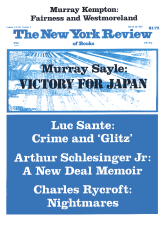Even the unluckiest of destinies have their instructional uses, and William C. Westmoreland’s bearing on the day he withdrew his suit against CBS demonstrates how protracted experience with illstarred commands can teach you how to put the best face on misfortunes.
He had struck his colors on a constricting field when all but he had fled. He was left pounded by heavy guns originally issued to him and now snatched away by his besiegers. Retired Major General Joseph McChristian and retired Colonel Gains Hawkins had both sworn that the Columbia Broadcasting System had correctly imputed to Westmoreland the doctoring of enemy strength estimate in Vietnam. His battle was ending with mass defections from his own camp.
Nature had not endowed him with the cold indifference to other men’s interests that the true conqueror must sustain for the full service of his own. He lacked the cunning to recognize the occasions which demand that courtesy cease to be unfailing. On January 21, 1982, CBS’s broadcast was still to come, but Westmoreland was aware of the harsh treatment impending. He also knew that Major General McChristian’s own interview had been no small contribution to the approaching embarrassment.
He telephoned McChristian. There seems to have been none of the wrath to be expected from an affronted soldier. Instead, there was only polite regret. When McChristian hung up after thirty minutes, he set down the highlights of their conversation in a memorandum to himself. They had discussed the moment in 1967 when Westmoreland declined to be cargo carrier for the “political bombshell” that he believed would have exploded had he transmitted McChristian’s assessment of mounting enemy strength. “[Westmoreland] said he thought our conversation was private and official and between West Pointers.” The old rule that some things regulars tell regulars are not for the ears of civilians had been horridly breached. The long gray line had become a line of long knives, and William C. Westmoreland was not as angry as he was sad. After all, McChristian’s old commander observed, “he had stood up for and taken the brunt of Vietnam for all of us.”
And he seems stuck with that assignment. After four months of trial he could only lay down his arms on terms that held no consolation beyond formally permitting him his honor. CBS offered its respects to “General Westmoreland’s long and faithful service to his country” and expressed its conviction that he had never been “unpatriotic or disloyal.” In exchange for this testament that even his harshest critics would not think to withhold from him, Westmoreland yielded up a tribute to “the long and distinguished journalistic tradition” of the same CBS he had accused of “rattlesnaking” him when he testified only last November.
Even so he said that in stipulating the never-disputed fact that he is a patriot, CBS gave him all that he had ever wanted. “If that statement had been made” immediately after CBS broadcast the documentary that had offended him or at any subsequent point, “it would have fully satisfied me.” We would have trouble locating anyone except himself who would not consider this a dubious satisfaction. His head was still high but his cause lay trailing in the dust. He had risked, and he had lost.
To measure what he had sacrificed, we need only look at where matters stood in the early stages of Westmoreland’s suit. CBS had suffered assaults that had left it with embarrassments that only defense at trial could lift from it. Its own internal investigation of the documentary’s procedures had been severe in several of its strictures, and some of its own employees were leaking their complaints in print.
Are we really to believe that, given CBS’s apparent beleaguerment, Westmoreland would have been fully satisfied with the bare affirmation that he loved his country? As things then stood, we can take it for granted that CBS’s treatment of Westmoreland would be a staple of those dreary and high-minded essays about what’s wrong with American journalism. If luck were ever Westmoreland’s lot, Federal Judge Pierre Leval would have ruled at that juncture that the general lacked sufficient grounds to sue.
Instead, the trial went forward, and CBS built a mountain of evidence that persuaded me at least that, compared to my own, its journalistic standards are a model of scrupulosity. William C. Westmoreland sued to rehabilitate his good name, and instead he so rehabilitated CBS’s that even he had to take part in ceremonial reverence for the “distinguished tradition” of the instrument that he had insisted until the end was his defamer.
CBS’s broadcast was unfair, although not defamatory, because it put all the blame on him alone. Economies in punishment are the American way. Totalitarians torment whole classes of people; we pick out one representative specimen and make him scapegoat for them all. Our national motto is: “Let twenty pass and stone the twenty-first.”
Advertisement
Lyndon Johnson sleeps in an honored grave; Walt Rostow still swells in his university chair; and General Daniel Graham, who pressed Westmoreland to the suit he was too shrewd to risk himself, still flourishes most charmingly on his lecture tours. Westmoreland may be nearer to innocence than any of them; yet they are free of travail and he has been left all by himself to endure the guns.
The sadness about Westmoreland is that he didn’t care enough for his own head to dodge the appointment when it was tendered; he is too upright to know when to duck.
This Issue
March 28, 1985



